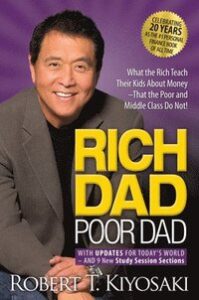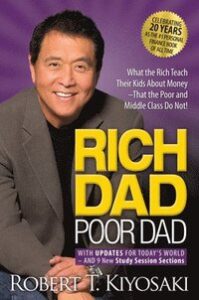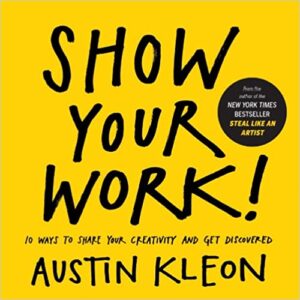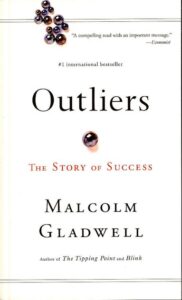Introduction
The author of this book had two fathers, his poor dad (biological father) and his rich dad (friend’s father). His poor dad followed the standard route most people recommend in life. He got a college education, found a stable and well paid job, worked hard but was struggling financially. His rich dad didn’t follow the standard route. He never went to collage but instead focused on building assets that generated income, continued learning about money and finance, kept looking for opportunities and eventually become financially free.
This book will teach us the six most important lessons from the rich dad so we can avoid struggling financially like the poor dad.
Lesson 1: The Rich Don’t Work for Money
Most people are told when they are young to go to collage, get a job and play it safe. During this time very few are given any kind of financial education. There are many people with a high income but still struggle financially. The main reason for this is because they don’t set aside money to invest so that money can work for them.
The title of this this lesson can be misleading. The rich do work, most likely harder and their work is more difficult, but their purpose is not money. Their purpose is to get money and turn them into financial assets that can earn money for them. Most of the money the rich earn come from their assets.
Life doesn’t teach you with words but by pushing you around through difficulties and challenges. Some people let life push them around without doing anything about it, others get angry and other start to blame others. But some people see it as a learning opportunity and welcome it. Whenever they get pushed it is a sign that they have something to learn. You wanna be part of this last group.
School is important but the problem is that most people see school as the ending of learning and not the beginning. Once we graduate we should instead see it as the beginning to learn the real important things that is needed to succeed such as finance, business, sales and negotiation.
What is the Rat Race?
A person stuck in the Rat Race has their life controlled by two emotions: fear and greed. The fear of not having enough money motivates them to get a job and work hard. Once they get their paycheck, greed and desire makes them start thinking about all the things they can buy. The pattern is then set.
Fear hits -> Go to work -> Get paycheck -> Desire and greed hits -> Buy things and pay bills -> No money left -> Repeat
To escape the Rat Race you need to be aware of these emotions, stop letting these emotions control you and admit it to yourself. Understand that if you live in fear then money will not solve it and the joy you feel when spending is only short-lived. Sooner or later you will return to the beginning again. Next time you make a decision ask yourself: “Am I making this decision out of fear or greed?”. Understand that a job is a short-term solution to a long-term problem.
Lesson 2: Why Teach Financial Literacy?
An asset puts money in our pockets and a liability takes money out. An asset produces income or increases in value over time. This can for example be stocks, index funds or real estate. A liability takes money from us because of the costs associated with them. This can for example be credit card loans, car loans or a mortgage. So a house is only an asset if it appreciates in value more than the cost of maintaining it.
Rich people buy assets. The middle class buy liabilities but think they are assets. The poor only have expenses. To become rich you want to acquire assets and keep expenses and liabilities low.
Lesson 3: Mind Your Own Business
The rich focus on their total assets while everyone else focus on their income statement.
It’s not how much money you make that is important. It’s how much money you keep and invest. Every time you invest a dollar you can imagine that it becomes an employee for you. So the plan for most people is to keep your day job, focus on building up your assets and eventually they will take care of you.
A problem today is that many people have no savings and financial foundation so they become too dependent on their job for income. This means they have to play it safe and can’t afford to take any risks. In the real world it is often the person who takes risks that gets ahead. There is always risk involved in when acquiring assets. So it’s important to know how to manage risk instead of avoiding it.
It is easier to change ourselves than other people around us. Instead of blaming others we should blame ourselves and understand that we are the problem. That way we can learn something new and improve ourselves.
Lesson 4: The History of Taxes and the Power of Corporations
Today it is mostly the middle class that pays most of the taxes and not the rich. That’s because the rich are legally avoiding taxes though the use of corporations / companies. By having a company, a person can write of their own expenses as corporate expenses and thus minimising their taxes. The reason for this is because corporate expenses are using pre tax money.
How corporations pay taxes: Earn -> Spend -> Pay taxes
How employees pay taxes: Earn -> Pay taxes -> Spend
The poor and middle class will always pay more taxes than the rich. The reason for this is because it is the person who works for money who gets taxed the most.
The largest expense for most people is taxes. Higher income results in higher taxes.
Lesson 5: The Rich Invent Money
To see new opportunities when they show up and give ourselves more options in life it is important to develop our financial IQ which consists of four parts:
- Accounting: The ability the read, understand and handle money.
- Investing: The ability to make money work for you.
- Understanding markets: Understanding supply and demand in different markets.
- The law: Know what the law is and how you can use it to your advantage.
Many people fail to see new opportunities because they want things to be like the past and resist change. They blame new technology or the economy but the real problem is their old ideas. The rich instead welcome change and look for new and creative ways to create value.
Lesson 6: Work to Learn, Don’t Work for Money
The greatest asset we have is our mind. Today many people are too focused on money instead of learning new things. If people keep an open mind and focus on learning then they will become richer because they can produce more value. It is suggested to seek work for what you will learn rather then what you will earn. A lot of workers are only looking for their next paycheck and not into the future. They never ask themselves where they are headed and don’t think how learning new skills can help them.
People who think money will solve their problems are wrong. Intelligence and knowledge solve problems and produces money. Money without knowledge is money soon gone.
It is also important to learn a little bit about many different things. The suggested skills to begin with are sales, marketing and then leadership.
- Sales: This includes communications skills, generating revenue and creating relationships with customers.
- Marketing: This will for example teach you how to present your product or service. It also helps you to know your audience and for your audience to know you better.
- Leadership: This can be knowing how to manage people, inspire and motivate people and move a group of people towards a goal.
Overcoming Obstacles
There are five main obstacles that prevent people to become financially free. These are fear, cynicism, laziness, bad habits and arrogance.
Fear
Everyone has the fear of losing money. So having fear is not a problem. The real problem is how you handle fear. Every rich person has lost money from investing. But there are a lot of poor people who have never lost a dime from investing. The fear has caused them to never even try. They are so afraid of losing so they take no action and the result is that they lose anyways. The main difference between a rich person and a poor person is how they manage fear.
Failure inspires winners and destroys losers. Winning means being unafraid to lose.
Cynicism
This is all the doubts we have when we take a risk. This can be our self talk for example: “I’m not smart enough” or “I’m not good enough”. It can also lead us into playing a “What if?” game. Such as “what if the economy crashes?” or “what if it does not go as planned?” These doubts will make us lose confidence. These doubts will create excuses and stop us from taking any action.
Bad times are generally the best times to enter the market. When everyone else is afraid, the rich act and are rewarded.
Laziness
Busy people are often the laziest. Many people confuse being busy with doing work that is really important. They stay busy as way of avoiding something they don’t wanna do. The solution is simply to stop fooling yourself and do what is important.
Don’t tell yourself “I can’t afford it.” Because this shuts down the brain. Ask yourself instead “how can I afford it?”. This activates the brain and it starts to search for answers.
Bad Habits
The bad habit most people have is that they pay themselves last. This means they first spend their money buying things and paying bills and lastly they invest what’s left. Instead we should first invest and then spend money on other things.
Arrogance
An arrogant person believes what they don’t know is not important. A mindset to have is: what I know makes me money and what I don’t know loses me money. The solution is to keep an open mind and educate yourself. This can be done through reading books or listening to people with experience.
Getting Started
If you don’t know where to start or don’t have a plan then here are ten suggested things that can be done. Remember that action always beats inaction.
- Have a reason and purpose for why you are doing what you do. This should be a combination of “don’t wants” and “wants”. For example: I don’t wanna work all my life as an employee, I want control over my time, I want to live a lifestyle I love.
- The power of our daily choices. We choose how we want to spend our time and money. It is suggested that our money should be spent on assets and time on educating ourselves. Develop good habits that will benefit you in the future.
- Choose your friends carefully. You become like the people you spend time with. Choose friends that have similar values as you. If you want money, choose friends who talk about money that you can learn from.
- Master the power of learning new things quickly. How fast you can learn new things is more important then what you know.
- Become more disciplined and pay yourself first. Stick with your good habits and get rid of the bad ones. Pay yourself first by putting aside money for investing before spending money.
- Select great people and pay them well for their work and advice they give you.
- When making an investment, ask yourself “How fast do I get my money back?”. Let the answer to this question be a part of your decision.
- Use money created by your assets to buy luxuries. Rich people buy luxuries last and the poor and middle class by luxuries first. A luxury should be a reward for investing in or creating a real asset.
- Have a role model to follow and look up to. Find someone who has done what you want to do and learn from them. The mindset should be “if they can do it then so can I”.
- If you want something, you need to give something first. This can be money, love, friendship, etc.





